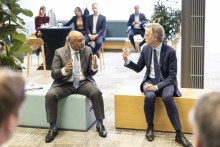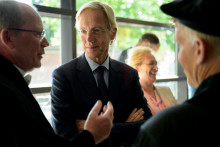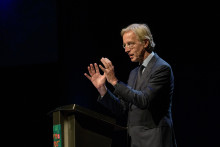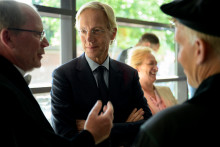Overcrowded lecture halls, shortage of housing, problems with language skills… On Thursday afternoon the House of Representatives once again debated internationalisation, one of the most sensitive topics in the politics of higher education.
The scepticism was tangible in the debate with Minister Dijkgraaf. ‘The glass-half-empty mindset that many of you have is all well and good’, the Minister said. ‘It may even be justified. But I’m a born optimist. I feel that the package of measures we have now is reasonably complete.’
Plans
The debate was about his plans to get a grip on the influx. For example, study programmes will be allowed to operate a fixed quota for the English-language version of the programme, so they can limit the number of internationals and at the same time guarantee that the programme is accessible to Dutch students.
There will also be a stricter language policy: study programmes in other languages will have to give better justification of why they are not teaching in Dutch. That applies particularly to Bachelor’s programmes, the Minister explained. The current law is inadequate, because ‘an enormous hole has been cut in that net’. The exceptions (Dutch, unless…) are currently too broadly defined, Dijkgraaf argued. ‘And then everyone can swim through it.’
Control
He also gave details of what he means by ‘a form of central control’, which he wants to set up. It boils down to ‘self-governance’ by the institutions, which have to decide between them how to approach internationalisation. They will be allowed to do that ‘within a strict framework’ that the Minister will outline for them, and in accordance with the recommendations of a new committee. Additionally, he wants to be able to put on the ‘emergency brake’ if necessary.
Needless to say, he came up against opposition. There are already so many controllers in higher educations, said Harm Beertema of the PVV, and they have allowed internationalisation to get totally out of hand. ‘All the supervisory board members, all the executive boards, all the programme committees, all the participation bodies, all the examination boards, all the review committees.’ Why would it work better this time?
But Dijkgraaf remained resolute. The institutions definitely understand the problem. ‘We are living in a different era. The system has become dysfunctional. Many of you have underlined the things that stimulate it, and we’re now entering a new era.’
Elephant in the room
The main stimulus is probably the funding. Many parties brought that up, because it is ‘the elephant in the room’ in discussions about internationalisation, as Lisa Westerveld of GroenLinks pointed out. In other words, the main issue that nobody mentions. Higher education institutions get funding for students who come to study there. So they benefit from having a large number of foreign students.
But what can be done about it? The funding of higher education falls roughly into two categories: the fixed part (which an institution always gets) and the variable part (which is dependent on the number of students). Maybe we ought to increase the fixed basic funding, several parties suggested, so that acquiring students becomes less important.
That was the view of GroenLinks, D66 and SP, for example. Other parties also thought something ought to be possible via the funding. As VVD MP Hatte van der Woude remarked: ‘If you don’t change the funding, nothing else will change either.’
In fact, the VVD would prefer a different form of control: according to Van der Woude, more money should go to the sectors that are of benefit to the Netherlands. Internationalisation is good, but: ‘As far as the VVD is concerned, we really don’t have to educate all the world’s coaches and communication experts.’
Holistic
Dijkgraaf avoided the latter topic; he wanted to leave those choices to the institutions themselves for the time being. He did explain, however, that tinkering with the funding is not so easy. Increasing the fixed basic funding might give greater certainty, but also has its drawbacks, for instance for study programmes that are growing.
And in any case, you can increase the fixed amount for higher education institutions, but what then happens to the rest? ‘I fear that the Minister of Finance will still pay me on the basis of the number of students’, said Dijkgraaf. So he warned against raising the fixed basic funding: the variable part would then become ‘a lot more variable’.
‘Institutions could even find themselves seriously underfunded’, Dijkgraaf warned. ‘You have to look at funding in a very careful, holistic manner.’
Summer
This summer, he will put a bill on internationalisation online, which everyone can then make comments on. He also announced that he wanted to steer the law through the House of Representatives and the Senate as quickly as possible. It will be about control, the fixed quota, language requirements, and so on. And the funding discussion? That is to be continued.







